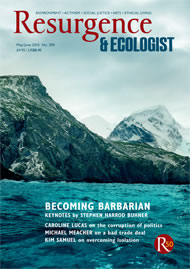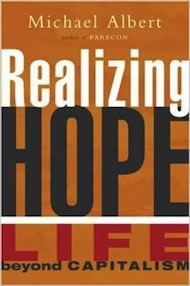The philosopher John Stuart Mill noted the advantages and defects of markets: good at generating economic value, terrible at the distribution. His conclusion, that wealth distribution is a societal decision, inspired the welfare state. Additionally Mill was a passionate advocate of producer cooperatives because they could both spread wealth and generate “mutual liberty” – a vision of democracy actively practised in our daily lives.
With the undermining of faith in politicians and markets since the crash of 2008, Michael Albert’s book provocatively revives such thinking. Why, he asks, are markets so sacrosanct if they patently generate global inequality and, uncurbed, are destroying our planet? To realise hope, he contends that self-management systems must become ubiquitous.
Self-management suggests cooperative ownership. Albert argues that social ownership is crucial for transformation, but shows that this is inadequate unless we tackle hierarchical cultures. To do so requires an institutional inversion that puts into practice four core values: self-management, solidarity, diversity and ecological sanity. He calls this model participatory economics, or parecon for short.
Parecon delivery structures are interdependent and include worker and consumer councils, to ensure people have a say in decisions proportionate to the extent they are impacted by them. Second, they deliver equitable remuneration: a just allocation of income not based on assets owned but on the hours worked, the intensity of the job and the onerousness of the conditions. Third, balanced job complexes overcome social, gender and racial divisiveness and rigid divisions of labour, and ensure that empowering tasks, good work and tedious chores are shared out fairly. Finally, there is participatory planning, which can overcome the flaws of markets and central planning systems.
Sounds utopian? Albert accepts this criticism, but argues that unless we pursue what we wish for, work out ways and means to achieve a qualitative difference, and get on with it, the system will remain a rigid divide where roughly 20% of people make decisions for the 80% who are subject to command and control. Through inaction this majority will remain saddled by what Albert calls the “coordinator class” operating across the private, public and non-profit sectors.
Albert accepts that change will take time and markets will remain until we can phase them out. However, to get on with this transformation we need to facilitate democratic debate and decision-making among the general public through decentralising models.
Accordingly, he argues that we need to practise subsidiarity and establish planning that operates by design from the ground up. We can see such creative energy in Spain and Greece, where relentless public spending cuts have unleashed waves of grass-roots innovation, with a plethora of new cooperative solutions emerging and spreading. Albert shows that what citizens begin themselves needs to be matched by transformations within the state.
He suggests a series of nested structures for democratic planning, to meet the needs for good work and public services and for legislation. Working from the bottom up, primary councils would involve 25 to 50 adults; each would appoint a delegate on their behalf for a second level council of 20 to 50. This council would then send a delegate to a third level of similar size, and so on up to a fourth or fifth level. The maths are intriguing in relation to participative democracy. A five-tier system with each level set at 25 could accommodate deliberative dialogues and decision-making for 19 million people. Clearly, for countries such as Scotland and Wales fewer tiers would suffice.
Additionally Albert explores participative governance in relation to science, technology, education, art, the media, sports and the judiciary. He offers no blueprints, but he demonstrates numerous gateways for mutual liberty.








